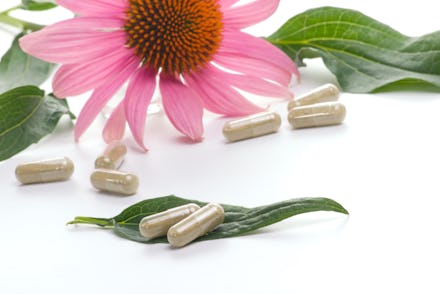People swear by echinacea, but can it actually help you prevent COVID-19?

You might recognize echinacea as an ingredient in the tea and cough drops tucked away in many a kitchen cupboard. A popular remedy for the cold and flu, some now claim this herb can prevent COVID-19. Others have praised its ability to relieve pain and anxiety. But the wellness world is also notoriously awash in dubious supplements. Is echinacea one of them — or can it really benefit your health?
First of all, what is echinacea?
Echinacea is a flowering plant native to North America, which Great Plains Native Americans have long relied on for medicinal purposes, according to the National Center for Complementary and Integrative Health. Dried or fresh echinacea is made into extracts, tablets, teas, and more. People often take it as a supplement for infections like the common cold, and dab it onto wounds or other problem areas on the skin.
Can it really prevent or treat colds and other respiratory infections?
Lab studies show that echinacea can increase white blood cells’ production of various cytokines, molecules that tell the immune system to initiate a response, says Melinda Ring, executive director of the Osher Center for Integrative Medicine at Northwestern University. Many studies have also looked specifically at whether it can prevent or treat respiratory infections, such as the cold and flu. The problem is, they tested different echinacea species, doses, and plant parts, “so it is tricky to compile them for a clear answer,” Ring tells Mic.
Taking echinacea as a preventative measure might lower your risk of a cold, and may modestly reduce symptoms if you do come down with one.
Based on the data so far, though, she notes that taking echinacea as a preventative measure may lower your risk of a cold, and may modestly reduce symptoms if you do come down with one. But there isn’t strong evidence to support its use for preventing or treating other infections. And while it’s shown activity against many viruses in cell and animal studies, there haven’t been clinical trials looking at whether this would actually translate to a lower risk in humans.
“In fact, there are concerns in the case of COVID-19 that use after someone has the infection… may be risky,” Ring says. Some COVID-19 patients seem to experience what’s known as cytokine release syndrome, when their immune system continues to fight the novel coronavirus well after it stops endangering the body, as the New York Times explains. Their immune system keeps unleashing cytokines, harming their organs and possibly even killing them.
At this point, she recommends considering echinacea for prevention, but to stop taking it if you notice symptoms of coronavirus infection.
It’s unknown whether echinacea, given its potential immune effects, could exacerbate the overactive immune system that leads to cytokine release syndrome and worse COVID-19 outcomes, Ring says. At this point, she recommends considering echinacea for prevention, but to stop taking it if you notice symptoms of coronavirus infection.
Can it relieve pain?
Research on lab-grown cells suggests echinacea may lower the inflammation that can lead to pain, Ring says, but reports that it can alleviate migraines and other painful conditions remain largely anecdotal. “There really isn’t enough evidence to use echinacea as a pain reliever," she says.
Does echinacea have mental health benefits?
Only a few studies have investigated the question of whether it can reduce anxiety, Ring says. One showed that taking 40 milligrams of an Echinacea angustifolia extract every day for a week improved self-reported anxiety. Other than that, there are very few human studies on this particular use of the herb. A US National Library of Medicine search of “echinacea, anxiety” turns up a mere 11 scientific journal articles. Basically, there isn’t enough evidence that it can relieve anxiety, either. But if you feel like it works for you, it's a relatively side-effect-free option — but always talk to a physician first if that's an option.
Should I take it?
The NCCIH seems to adopt a “buyer beware” attitude for echinacea products, which might be made with different species and parts of the plant, or with ingredients other than echinacea. “Most of these products have not been tested in people,” the agency warns.
A healthy dose of caution is crucial.
That said, taking echinacea orally, at least short-term, is likely safe for most people, although it may result in stomach pain and other digestive tract side effects, according to the NCCIH. Whether echinacea is safe to take long-term, however, remains unclear.
Don’t take echinacea if you have ragweed allergies, Ring says. (Echinacea and ragweed are part of the same plant family, so a ragweed allergy might make you more susceptible to an echinacea allergy.) And if you have an immune-related condition, such as an autoimmune disease, she suggests using it only under the guidance of an expert in dietary supplements.
In general, if you're considering taking echinacea, “my recommendation is always that it is best to seek out the counsel of an integrative medicine doctor who can make recommendations that are safe and effective,” she says. “Many are doing televisits now to help support people during this pandemic.” Especially now, when we’d love nothing more than an herb that can prevent or cure all manner of ailments, including COVID-19 — and wellness influencers are eager to sell them — a healthy dose of caution is crucial.